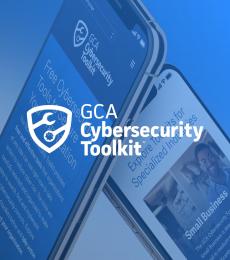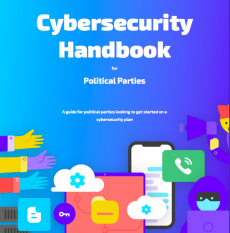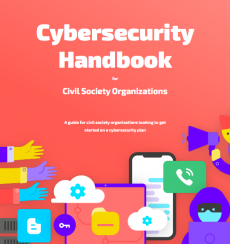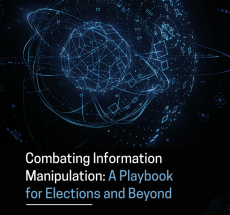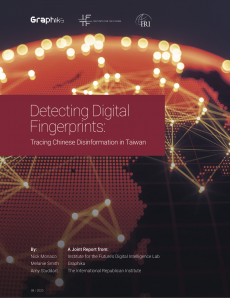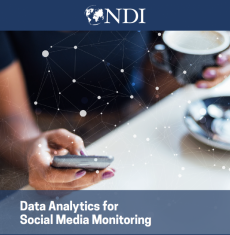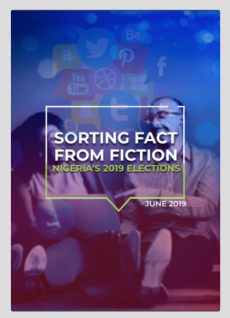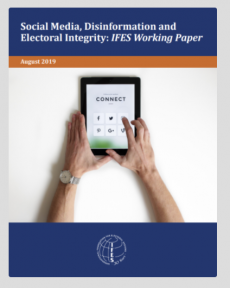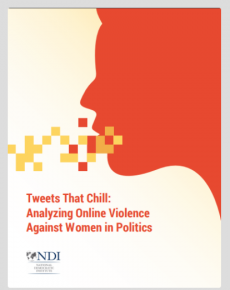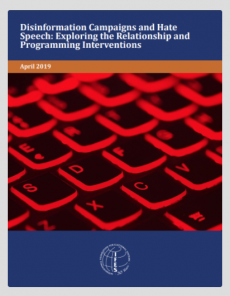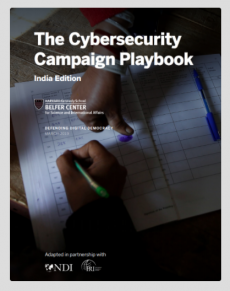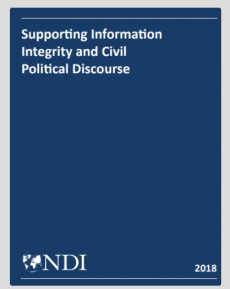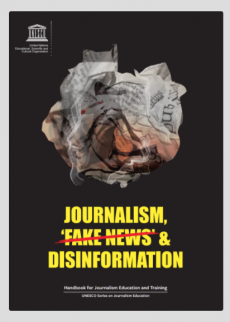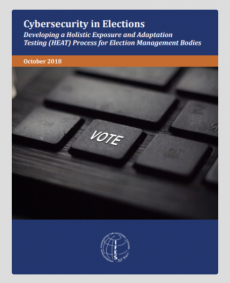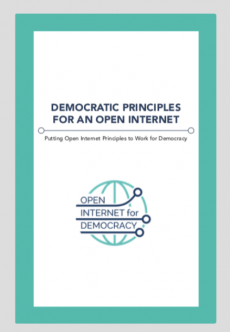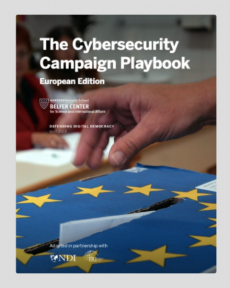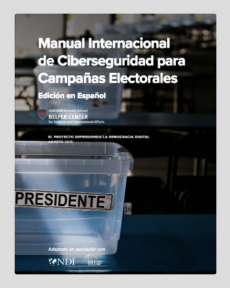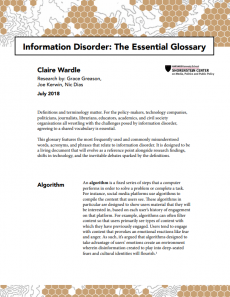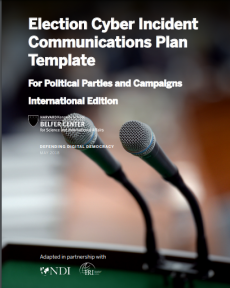The D4D Coalition recommends these resources, developed by D4D members and partners, to help your organization protect its mission and fight for democratic resilience. These resources include toolkits, case studies, working papers, tech guides, and reports.
Coalition Resources
Domain Trust
Domain Trust is an intelligence platform that provides registries, registrars, and cyber protection agencies high quality, large-scale sets of data on suspected malicious and criminal domains that are being used in phishing attempts, malware distribution, and command and control (C2) activities. This data provides them the intelligence upon which they can take further action: investigation, suspension, or disablement.
Domain Trust was created and made available by the Global Cyber Alliance.
Automated IoT Defence Ecosystem (AIDE)
The Global Cyber Alliance’s Automated IoT Defence Ecosystem or AIDE project consists of an information-sharing platform that will enable the automated collection, analysis, distribution, and display of attacks on IoT devices, as a means to ultimately implement mechanisms of distributed defense within the large IoT community, from manufacturers and researchers to regulators and smart cities.
AIDE was created and made available by the Global Cyber Alliance.
Quad9
Quad9 is a free service that replaces your default ISP or enterprise Domain Name Server (DNS) configuration. When your computer performs any Internet transaction that uses the DNS (and most transactions do), Quad9 blocks lookups of malicious host names from an up-to-the-minute list of threats. This blocking action protects your computer, mobile device, or IoT systems against a wide range of threats such as malware, phishing, spyware, and botnets, and it can improve performance in addition to guaranteeing privacy. The Quad9 DNS service is operated by the Swiss-based Quad9 Foundation, whose mission is to provide a safer and more robust Internet for everyone.
Quad9 is created and made available by the Global Cyber Alliance.
Domain-based Message Authentication, Reporting and Conformance (DMARC)
DMARC is a mechanism that allows senders and receivers to monitor and improve protection of their domain from fraudulent email. Implementation of DMARC will ensure mail recipients can detect when spammers have spoofed the “From” address on mail messages. An implementation guide is also available.
DMARC was created and made available by the Global Cyber Alliance.
GCA Cybersecurity Toolkit
The GCA Cybersecurity Toolkit is an online resource that includes free and effective tools businesses can start using right now to make an immediate impact on reducing cyber risk. GCA provides toolkits specifically for small businesses, journalists, or election offices.
Created and made available by the Global Cyber Alliance.
Political Parties Handbook for Cybersecurity
This cybersecurity handbook created by D4D member, the National Democratic Institute, enables political parties to easily and effectively create plans to protect themselves and their candidates online.
Cybersecurity Handbook for Civil Society Organizations
This cybersecurity handbook created by D4D member, the National Democratic Institute, enables civil society organizations to easily and effectively create plans to protect themselves and their partners online.
Combating Information Manipulation: A Playbook for Elections and Beyond
The International Republican Institute, National Democratic Institute, and Stanford Internet Observatory developed the Combating Information Manipulation: A Playbook for Elections and Beyond. Informed by best practices and lessons learned by civil society, governments, academics, and other practitioners around the world, the playbook is intended to help leapfrog the first six months of the electoral preparation process and enable societies to effectively push back against efforts undermining free and fair elections, supporting democratic processes and rights more broadly.
The playbook guides users on how to 1. identify, 2. respond and 3. build resiliency to information manipulation. These three sections empower users to build their knowledge on mapping the information environment; recognizing common information manipulation narratives; reporting to platforms, governments, or election management bodies; developing public awareness campaigns; and improving digital literacy.
The Playbook is available in English, French, Spanish, and Arabic at the links below.
Combating Information Manipulation: A Playbook for Elections and Beyond (English)
Combating Information Manipulation: A Playbook for Elections and Beyond (French)
Combating Information Manipulation: A Playbook for Elections and Beyond (Spanish)
Combating Information Manipulation: A Playbook for Elections and Beyond (Arabic)
Free, Open Source Tools for Internet Freedom and Cybersecurity
This is a list of a selection of resources and tools supported by the Open Technology Fund and the NED family.
This document is for the purpose of raising awareness of open source internet freedom tools being developed to support digital human rights. It is not comprehensive or an endorsement of using these tools in any specific country or program context. These tools and resources are each in various stages of development. Some tools are already in widespread use and are working on enabling new features or improvements, while others are currently making improvements at a core functionality or security level. This list is a living document and will be updated as often as possible.
If you have questions or ideas of other tools to include, please contact Madeleine Nicoloff ([email protected])
Detecting Digital Fingerprints: Tracing Chinese Disinformation in Taiwan
In June 2019, with the 2018 local elections as a point of reference, Graphika, Institute for the Future’s (IFTF) Digital Intelligence Lab, and the International Republican Institute (IRI) embarked on a research project to comprehensively study the online information environment in the lead up to, during, and in the aftermath of Taiwan’s January 2020 elections, with an awareness of the 2018 precedents and an eye for potential similar incidents throughout this election cycle.
Published by the International Republican Institute.
Data Analytics for Social Media Monitoring
This guide is designed to help democracy practitioners better understand social media trends, content, data, and networks. By sharing lessons learned and best practices from across our global network, this guide empowers practitioners to make democracy work online by helping them understand data collection, locate the sources of malicious content, and use the tools of social media monitoring to support their objectives.
Published by the National Democratic Institute (NDI).
Sorting Fact from Fiction: Nigeria's 2019 Elections
The Centre for Democracy and Development’s Election Analysis Centre (EAC) for the 2019 presidential and gubernatorial elections represented the first attempt in Nigeria at running a rigorous fact-checking process before, during and after the electoral process of both presidential and gubernatorial elections. CDD’s specific mandate was to provide a filter and check on viral stories that were demonstrably false. Or to confirm, with sources and justification, if certain events were true. To do this CDD worked in collaboration with the National Democratic Institute and the Premium Times. However, there is scope for greater collaboration with other like-minded institutions such as the Independent National Electoral Commission (INEC) in the future.
Published by the Centre for Democracy and Development (CDD).
Social Media, Disinformation, and Electoral Integrity
In recent years, the prevalence of disinformation, particularly through social media, and its threat to the integrity of elections have become an issue of global concern. While this space is rapidly changing and developing, a better definition of problems and terms, and a deeper understanding of the challenge that social media disinformation poses to electoral integrity are needed.
A new International Foundation for Electoral Systems (IFES) working paper on Social Media, Disinformation and Electoral Integrity examines this challenge and seeks to answer important questions. Is social media fundamentally different from traditional media and in what way? Does the state have a role in regulating this sector, and if so, what level of regulation is appropriate to ensure respect for fundamental freedoms? How can citizens be better informed to ensure that they are making choices based on accurate information and facts, rather than disinformation, hate speech and other types of divisive influence campaigns as there is a conceptual link between these two different but often interrelated phenomena of disinformation and hate speech?
The paper offers responses election management bodies and international nongovernmental organizations can take to attempt to mitigate the negative consequences, presenting the latest innovative thinking, solutions and tools being applied by IFES and other key organizations and the recent developments in this field.
Published by International Foundation for Electoral Systems (IFES).
Tweets That Chill: Analyzing Online Violence Against Women in Politics
In the three case study countries (Colombia, Indonesia, Kenya), NDI’s Gender, Women, and Democracy team worked with women in politics, those in civic technology and women’s rights organizations to develop a way to examine the country specific challenges facing women as they engage in online political discourse. The outcomes of the case studies confirmed that across the three countries women engaging in politics online experienced similar types of violence including insults and hate speech, embarrassment and reputational risk, physical threats, and sexualized misrepresentation. While the report represents the right step forward in eliminating barriers to political participation for women, it also highlights the need for additional research to understand and mitigate the impact of online violence.
Published by National Democratic Institute (NDI)
Disinformation and Electoral Integrity: A Guidance Document for NDI Elections Programs
This document outlines NDI’s programmatic approaches to addressing the threat of disinformation in the electoral context, particularly the actions citizen election observers and international observers can take to mitigate, expose, and counter disinformation. It also stresses the importance of using open election data to deter disinformation and advocacy around norms and standards to counter disinformation.
Democratic elections rely on a competitive process, faith in electoral institutions and informed participation. The strategic deployment of false, exaggerated or contradictory information in the electoral environment has been a potent tool for undercutting these democratic principles in many places around world. Deliberately blurred lines between truth and fiction amplify voter confusion and devalue fact-based political debate. Rumors, hearsay, and online harassment are used to damage political reputations, exacerbate social divisions, mobilize supporters, marginalize women and minority groups, and undermine the impact of change-makers. Manipulation of voter and civic information dampens participation and degrades trust in election management bodies. Such conditions can destabilize political environments, exacerbate potentials for electoral-related violence, pervert the will of voters, entrench authoritarians, and undermine confidence in democratic systems more broadly.
Published by the National Democratic Institute (NDI).
Disinformation Campaigns and Hate Speech: Exploring the Relationship and Programming Interventions
In a new brief, the International Foundation for Electoral Systems (IFES) outlines how the latest generation of technology-fueled disinformation campaigns is amplifying the scourge of hate speech and offers a framework for democracy and governance practitioners to consider when designing interventions to effectively counter these dual threats.
The calculated amplification of hate speech is only one of many tactics deployed in disinformation campaigns, but it is a common and highly toxic one worthy of particular attention. Disinformation Campaigns and Hate Speech: Exploring the Relationship and Programming Interventions builds on established IFES thought leadership on countering hate speech in political and electoral contexts to distinguish how hate speech and disinformation differ, and why that distinction matters for those looking to mitigate the harmful effects of both.
Published by International Foundation for Electoral Systems (IFES).
The Cybersecurity Campaign Playbook: India Edition
Political campaigns need to protect themselves from hacking and often don’t know where to start. The good news is that there are a few fundamentals that can dramatically reduce the likelihood and impact of cybersecurity incidents.
Produced by Harvard’s Belfer Center in partnership with D4D Coalition members NDI and IRI, the Cybersecurity Campaign Playbook was adapted for an Indian context to present high impact, easy to understand cybersecurity principles and practices that every campaign should put in place. It provides an easy to understand framework for managing cybersecurity risk, an overview of how to secure your campaign, how to plan for incidents, and a Top 5 checklist.
Published by the International Republican Institute (IRI), National Democratic Institute (NDI), and Harvard University's Belfer Center.
Supporting Information Integrity and Civil Political Discourse
As we know, disinformation is a growing and critical threat to democracy worldwide. Disinformation is spreading more rapidly and widely, and is being used to distort political discourse, spread cynicism, and distrust in governing institutions, and interfere with citizens’ abilities to make informed political decisions.
This resource, Supporting Information Integrity and Civil Political Discourse, is intended to to assist civic and political activists with an interest in protecting the space for informed dialogue and public deliberation. This includes ensuring the flow of accurate information and supporting the practice of civil political discourse.
Published by the National Democratic Institute (NDI).
Journalism, 'Fake News' and Disinformation: A Handbook for Journalism Education and Training
For those directly involved in empowering journalists and student journalists, this handbook provides a framework for inquiry, and lessons to help navigate the increasingly murky information environment. It examines the deployment of ‘fake news’ as a term to discredit journalism, and sets out an alternative framework covering disinformation and misinformation, and (to a lesser extent) mal-information and emotive propaganda. The lessons are contextual, theoretical and in the case of digital verification, extremely practical. The curriculum falls into two distinct parts: the first three modules frame the problem and give it context, while the last four focus on responses to ‘information disorder’ and its consequences.
Published by UNESCO
Cybersecurity in Elections
This report was published by the International Foundation for Electoral Systems (IFES), a member of the D4D coalition. The publication details a Holistic Exposure and Adaptation Testing (HEAT) process and outlines strategies that election management bodies can use to strengthen their technology and procedures to resist vulnerabilities.
Published by the International Foundation for Electoral Systems (IFES).
Democratic Principles For An Open Internet
The Democratic Principles for an Open Internet have been primarily designed for citizens and civil society organizations in fragile and emerging democracies, who are new to the digital rights space, are beginning to engage more regularly online, and who may be more likely to encounter deliberate internet disruptions as a result of government interference. We hope this guide will help activists working for democracy in an internet age and connect them in global peer networks to exchange best practices. The guide also serves as an advocacy tool that organizations can utilize in pushing governments, the private sector, and civil society to adhere to universal human rights through open internet principles and standards.
The Open Internet for Democracy Playbook serves as a companion piece to the Democratic Principles for an Open Internet, which is a framework for understanding what principles must be upheld in order for the internet to foster democracy.
Published by Center for International Private Enterprise (CIPE), the National Democratic Institute (NDI), and the Center for International Media Assistance (CIMA)
The Cybersecurity Campaign Playbook
Political campaigns need to protect themselves from hacking and often don’t know where to start. The good news is that there are a few fundamentals that can dramatically reduce the likelihood and impact of cybersecurity incidents.
The Cybersecurity Campaign Playbook, produced by Harvard’s Belfer Center in partnership with D4D Coalition members NDI and IRI, presents high impact, easy to understand cybersecurity principles and practices that every campaign should put in place. It provides an easy to understand framework for managing cybersecurity risk, an overview of how to secure your campaign, how to plan for incidents, and a Top 5 checklist.
Published by the International Republican Institute (IRI), National Democratic Institute (NDI), and Harvard University's Belfer Center.
El Manual Internacional de Ciberseguridad para Campañas Electorales - Edición en Español
Las campañas políticas deben protegerse de la piratería informática, o hacking, y muchas veces no saben por dónde comenzar. La buena noticia es que hay algunos fundamentos que pueden reducir drásticamente la probabilidad y el impacto de incidentes de seguridad digital.
El Manual Internacional de Ciberseguridad para Campañas Electorales, escrito por el Belfer Center de la Universidad Harvard en colaboración con lo miembros de la Coalición D4D, NDI y IRI, presenta principios y prácticas en seguridad digital de alto impacto y fácil de comprender que toda campaña debe poner en uso. El manual provee un marco operativo fácil de comprender para manejar riesgos de seguridad digital, un repaso amplio de las maneras que puede proteger su campaña, algunos métodos de planificación para responder a incidentes, y una lista de verificación con las cinco medidas más importantes.
Publicado por el International Republican Institute (IRI), National Democratic Institute (NDI), and Belfer Center de la Universidad Harvard.
Information Disorder: The Essential Glossary
Definitions and terminology matter. For the policy-makers, technology companies, politicians, journalists, librarians, educators, academics, and civil society organisations all wrestling with the challenges posed by information disorder, agreeing to a shared vocabulary is essential.
This glossary features the most frequently used and commonly misunderstood words, acronyms, and phrases that relate to information disorder. It is designed to be a living document that will evolve as a reference point alongside research findings, shifts in technology, and the inevitable debates sparked by the definitions.
Published by Harvard University's Shorenstein Center on Media, Politics, and Public Policy.
Election Cyber Incident Communications Plan Template for Political Parties and Campaigns
In November 2017, the Harvard Kennedy School’s Belfer Center for Science and International Affairs released “The Cybersecurity Campaign Playbook” for campaign professionals. In February 2018, it released a set of three U.S. elections playbooks designed to be used together by U.S.-based election administrators: “The State and Local Election Cybersecurity Playbook,” The Election Cyber Incident Communications Coordination Guide,” and “The Election Incident Communications Plan Template.”
Following the release of those playbooks, we heard from international organizations about the need for similar preparation globally. To respond to this need, we are releasing the “Election Incident Communications Plan Template” for a global audience. Wherever election cybersecurity incidents occur, political parties, campaigns, and others supporting democratic elections should be equipped with the tools to communicate quickly and effectively to maintain confidence in the democratic election system.
Published by the International Republican Institute (IRI), National Democratic Institute (NDI), and Harvard University's Belfer Center.





